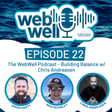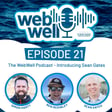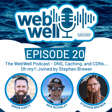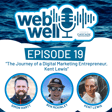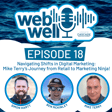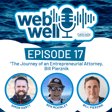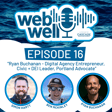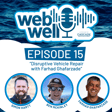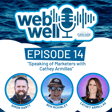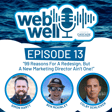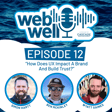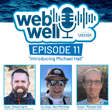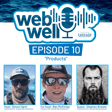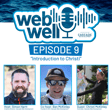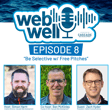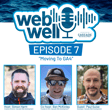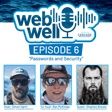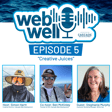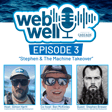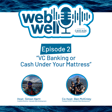Introduction to Web Well Podcast
00:00:06
Speaker
Welcome to the Web Well podcast brought to you by Cascade Web Development. I'm one of your hosts, Simon, along with Ben. And we can't wait to dive into all things internet, tech, web development, and web design.
00:00:20
Speaker
We'll also be discussing how we balance work and life and exploring the fascinating world of internet innovation. So whether you're a tech enthusiast or just looking for some entertainment, join us on this exciting journey as we explore the ever-changing landscape of the web. Thanks for tuning in and let's get started.
First External Guest: T Getzi
00:00:40
Speaker
All right, welcome back, everyone. We are here and joined with my buddy T. Getzi from Spokane, Washington. This is episode number four. Topic of the day is mass and social medias. So kind of breaking those out. But let's start with intros. T, welcome. Thanks for joining us. How's it going? Things are good. I'm excited to be on your podcast and get this conversation going.
00:01:09
Speaker
Yeah. It's, it's nice. I think you are our first out of organization guest. I know we're bragging up, you know, episode number four. Uh, we had Stefan, our technical director last week or last podcast, but he's part of the organization. So you being the first outside of the organization, honestly, and on this topic, I could see you coming back for some more later this year. Yeah. I think, I think I'm stoked for that. So.
T's Journey from Soccer to Academia
00:01:37
Speaker
Tell us, tell us about yourself T. Where, where are you from? What do you do for fun? Job wise, career wise, and, and we added in a little stuff that we were talking about before this, how you and I met. Sure. So live in Spokane, basically born and raised in Spokane. Uh, at a young age, my parents took me down to Eugene for a little bit and they're definitely in that hippie world and made a living down there and came back to Spokane and
00:02:05
Speaker
Grew up in Spokane and soccer and snowboarding were my two passions and playing college soccer was like my number one thing that I wanted to do. Then I kind of got injury riddled and then kind of stuck with snowboarding and ended up dropping out of school to ride Mount Baker and delayed my college career and spent a lot of time in the restaurant business. And that opened up a lot of time for me to travel. And that's kind of was my next passion outside of soccer and
00:02:33
Speaker
snowboarding was to just see the world. So I kind of got a late start and the whole idea of college had, you know, done my time, but went back and finished as a non-traditional student and brought through that, indicating my master's in communication. And that's kind of what landed me here. So currently, I work at Eastern Washington University. I'm a lecturer there.
00:02:59
Speaker
and communication studies. I teach classes from public speaking, leadership, interpersonal communication, argumentation advocacy. And then one of my favorite classes is the mass media and information society, and then a digital and social media class. So really kind of ties in with this topic. And then I've been adjuncting at SCC. So I'm fortunate to be giving back to our community.
00:03:26
Speaker
It's something that I knew I wanted to do, but when I was going through this process of going back to school, there's two things I knew I wanted. I wanted to work with people and I want to make their lives better than when I was with them before. So if that was working with nonprofits, that was one route, doing community outreach or community relations for an organization or teaching. Those are the two things I knew I was really passionate about and wanted to do. And so that's kind of what took me to where
00:03:55
Speaker
I am now, so being able to give back to the community, working at the community college at an institution I went to makes me feel really good, and then as well as representing the college that I graduated from with my undergrad and graduate, that's super exciting. Yeah, so two things.
Sports and Related Injuries Discussion
00:04:12
Speaker
SCC Spokane Community College, just to clarify that. And then the second question, T,
00:04:21
Speaker
You had injuries because of soccer and then you chose snowboarding. Well, basically I would, I love skateboarding, but my soccer coach didn't want us skateboarding because of the injuries and just the timeframe of being in the Northwest. It's cold here in Spokane. We get lots of snow and it was the next best thing. So why not spend the winter up on the mountain? And yeah, I had a ACL. I broke my leg when I was 14 snowboarding and just made varsity as a freshman fair sized school.
00:04:52
Speaker
And the next weekend I went out and then broke my leg in like 13 places up in Whitewater. And so I just sit out and then re-wracked around. And four years later, my senior year, right before our potential state winning season, I tore my ACL playing indoor and I played with it torn as captain of our team. We ended up winning state. We're the first team in Eastern Washington to win state. Um, and any soccer men are women. So kind of opened up the floodgates after that. And a lot of teams ended up doing that.
00:05:20
Speaker
after us, but we're the first ones to go through. And that's it. That's what took me to the community college in the first place. I was injured, didn't have money to go to school outside of scholarships that I'd lost from being injured and tried to figure stuff out and moved over to Bellingham. And that didn't work out for me either. So I got a great education in the back country. My mom was not happy when I came back, not in school. And yeah, it just took me a little longer to figure it out, but I got to see the world. So I traded life experiences.
00:05:49
Speaker
I feel like for that college experience. And then I think the question that didn't answer is that how you and I met, is there something else that you wanted me to touch on or should I go into that? Where do you want to go? Were you jumping in?
00:06:04
Speaker
No, I mean, I, I, it sounds like really good life choices from my, uh, my perspective. I was kind of thinking to myself, I actually, I took a year off of football my sophomore year. Cause I was afraid of hurting myself in that sport. Cause I love ski racing.
00:06:20
Speaker
which actually my junior year took me up to Schweitzer, went to Sandpoint High School for the winter to pursue that dream. So I spent some time up in that neck of the woods and a lot of Spokane kids were over there, you know, enjoying the privileges of highly supportive parents in pursuit of that sport.
00:06:39
Speaker
And then I didn't, I spent my college years playing football and I started coaching
Cycling Connection with Simon
00:06:44
Speaker
skiing and ski racing, but it didn't, didn't get into the back country until after I graduated and, and, you know, reflecting on, gosh, what would I have done differently if I wasn't so committed to the sport of football and college and had all that time and energy to dedicate to continue to stack up those skills and experiences in the mountains.
00:07:02
Speaker
Uh, I don't know if nothing else, it really, it really confirmed my, my love and appreciation for the mountains such that when I came out, I was able to quickly shed about 60 pounds of unnecessary weight and, uh, continue walking uphill and enjoying, you know, sliding down on track snow. So I've been kind of doing that for the last quarter century, it feels like. Yeah. Yeah. So same parallels with that. I did the same thing when I moved back to Spokane. I coached soccer for a long time and I was actually president of the club that
00:07:29
Speaker
I played for and I volunteered my time for that while I worked in the restaurant business and coaching just took up a little too much time for me and I wanted to play. I wanted to play on the weekends. It just didn't allow that. I hear you. I just finished my 27th year of ski coaching in some capacity at last seven or eight and focused on big mountain and back country.
00:07:51
Speaker
skiing and, uh, love it. And the great thing now is that I've got, I've got two daughters and I've been able to dovetail my desire to be in the mountains with involving them and kind of life hacking that ridiculous expense of, of taking a family to the mountain every weekend. Um, but through coaching, but yeah, it seems like some really, um, awesome through lines there of, uh, the mountains and the ball sports and the individual sports and the team sports. And yeah, lots of good learning throughout that. For sure. Yeah. It was.
00:08:19
Speaker
You have the light coming for you. There's lots of days in the mountains left. Yeah, indeed. So T, it's surprising that I actually didn't meet you playing soccer because I played indoor and I think we've talked about this too, that we knew some of the same people, at least like
00:08:34
Speaker
you know, coaches or, or refs more specifically. Um, but playing it, it spoke in indoor. Uh, I remember doing that a bunch of nights until my shins just could not take, uh, shin splints, uh, just running on that turf. It just hurts so bad. But yeah, why don't, why don't you talk about, uh, how you and I met shoot a decade or two ago. Yeah. So that was, uh, as said seven knee surgeries before 30 and a couple in between with other.
00:09:04
Speaker
arms and shoulders, but it was between soccer and snowboarding. It was just getting me unlucky on some occasions, but sometimes it was just my own fault of being stupid. And I spent a lot of time on the couch and I was watching the Tour de France a lot. And I fell in love with it when I was like 14. And it was kind of like a guilty pleasure. I didn't really tell anybody. Nobody else I knew was watching it. And the strategy behind that this found fascinating. And then years later, I was laid up again and I caught a book.
00:09:32
Speaker
Um, it was called the immortal class about a bike messenger. He leaves his corporate job and is a bike messenger in Chicago and great story. And, um, the tour was just kind of wrapping, you know, starting to, or started, it was just starting. And I was like, man, I need a, I need a bike. And you were managing down at the, at the, but our wheel sport, uh, south, south, it will support camera, whatever it's called. That's no longer there, but you were there and I went in and saw a bike that I could afford. No, I was eyeing it and you're, you know,
00:10:02
Speaker
not trying to sell me on anything, which I appreciated. So I think that's where some of the rapport went. And I was like, Hey, can I buy this? And you're like, no, I have it on hold for somebody. And then you're like, but if you want it, if you come back on Tuesday, the bike is yours. And I showed up on Tuesday and I was like, it was a bike for sale. And you're like, yeah. And that's what started it. And I didn't know anything about bikes. So I was in all the time. Like, how do I change a tire? You know, like, I don't know how to oil a chain. Like, I don't know anything.
00:10:27
Speaker
And then that's where it kind of started. They're like, Oh, we were on these bikes with like, you know, no brakes and watch this video. And I was like, what is a trap fight? So that's what kind of opened up more. So within like one year of riding, like run by, so I was riding a bright bike with no brakes. Um, which was a lot of fun, but you talked about Joe Parrazzo, which I think is funny because he asked me to play soccer. I don't know if you're on that indoor team and phenomenal bike rider. Yeah. Yeah. I remember it was like the first time I got on the field and came back and he was like, winded on the side. And he looks at me and he goes.
00:10:56
Speaker
We ride bikes and we play soccer. And I was just like, yep, that's totally true. Cause my bike game is like, not like I'm not a downhill mountain biker. I'm not a fast road biker. I enjoy being out there. I'm just kind of leaving at that. So yeah, that's how we met was, uh, uh, you working and giving me a chance to buy a bike when someone else was a pulling trigger. That's funny.
00:11:18
Speaker
Yeah, that's right. So yeah, before, like you, uh, I went back to school, uh, a little late in the game too, right out of high school. Uh, I went and got certified as a bike mechanic down in Ashland, uh, Oregon at United Bicyclons too. And then came back to the Seattle area and got a job, started working at bike shops, moved to Spokane, just to get away from busy Seattle area.
00:11:41
Speaker
And started working at bike shops, worked my way up, managed, uh, a couple of shops and, uh, man, the relationships I had coming out of that, uh, is pretty awesome tea. You're, you're an example of that. We've known each other for man. Again, I want to say like 18, 17, 18 years, you know? Uh, and then he was a groomsman in my wedding too. And that was, uh, Amy's not here. That was 13 years ago. So yeah, I mean, shoot, that was a long time ago.
00:12:11
Speaker
Well, welcome T, I'm glad that you're joining us. I was telling, not selling, telling Ben about you and our relationship and how we knew each other.
00:12:23
Speaker
and how there's a lot of commonalities between, you know, people that like outdoors that have that passion. Even if Ben can get over the fact that you and I both go sideways down the hill instead of on two little snowboards going face first, you know? All good, baby. All good. We all like that good snow. So we have a Monday morning meeting tea that we come back and Ben and I are always like, yep, we were up on the mountain.
00:12:50
Speaker
you know, and just kind of commiserating, you know, how the snow was and if it was good or bad. And, you know, so I do know that Ben gets up a lot earlier than I and earns his downs by doing a lot of going up. So props to him because I'll sit on a chair. Yeah. Yeah, I agree. I do a lot of sitting as well.
00:13:13
Speaker
When the snows, I do a lot of side-country, so I am hiking for it, but yeah, if I can spend time spinning, I'll spin around on that chair as much as possible. There's not that many people here, so I guess we can still do it in some of the areas.
00:13:30
Speaker
Well, perfect. We'll kick off into our topic, which really, honestly, I think this group, you guys, we could probably go off on a bunch of other things, injuries, bike injuries, ski injuries, snowboarding injuries.
Social Media vs Mass Media
00:13:43
Speaker
But today's topic going into mass and social media is
00:13:48
Speaker
I also kind of had a social media background or I shouldn't say kind of. I did have a social media background where my first job in software industry, I was managing a bunch about 500 plus social media accounts for a software company here in town where
00:14:10
Speaker
Uh, our clients, I basically had to create content for them, reach out to them, work on them, uh, train them, teach them, encourage them, squeeze every little bit of, you know, authentic content from them. And that was my first go in, in career wise, uh, in social media. But I think it's, it's super interesting topic.
00:14:35
Speaker
It's kind of a topic that's plagued, I think a lot of youth, a lot of kids, us, our generation coming into it. So I guess let's start off. Let's, let's define media. Let's define social media and mass media to you. I'd love to know what your, your opinion is, or at least your, your definition. How would you define social media platforms? Yeah. So getting on with like social media platforms, I think the best way to think of it is it's use your created content.
00:15:06
Speaker
So with that sense, we think of this, you know, platform, like a visual platform that we have, someone owns that platform and we're using that platform, right? To be able to post our content. And when we sign up for that app or that platform, they consider it being free. And yes, it is free, but it's also transactional. So they're taking something from us as we get to use this free service.
00:15:32
Speaker
So when we think of it just as a regular user, we stay connected with friends that way. We're using this platform to post our pictures, to show what we're doing. And that's basically right at the simplest form of it. I think it's important to think that someone else owns that platform that we're posting our content on. We don't own that platform.
00:15:54
Speaker
And I think that's important when we start thinking of social media and that it is this transaction. And I think that's really important when I start talking about like the idea of mass media is that they're using our information. They're using our information to collect data so that they can potentially sell it. If you want to say that it's selling, at least sell the analytics to someone else, then, you know, a company can place ads. When you think of it's more of an ad machine than it is a social media machine. And that's the way I am looking at
00:16:24
Speaker
these platforms. So the first way I use it is like everyone else, I want to have fun. I want to post stuff on there. But then I start thinking this, this critical theory of what's behind the scenes. What's the motor that keeps this social media platform going? And that's advertising. That's how we advertise. Now it's, it's a great way to get a message out. And the neat thing about a lot of these social media, I mean, double absorb, I guess. So when I say neat, doesn't mean I always agree with myself.
00:16:51
Speaker
But the neat thing is that is you can create content that blends in to everyday photos, everyday content that we're posting for fun. So that's just kind of nice compared to, um, like on the TV, if you're watching TV or TV, you know, has commercials, the commercial comes on. The first thing I want to do is just skip out of that commercial on Instagram. Let's say you're just, you just slide through on Facebook. You just click, you know, the next story to get through. So it's, it's easier for us to not be distracted.
00:17:20
Speaker
by the ads and that's another reason why it works so well. So from that sense, from a business standpoint, it's a great way to get your content out there for just our everyday user. We're just not as distracted by those ads. So it works really well for us that we can just kind of skip through it. And we really don't notice it that much. So, um, with my definition of that social media, it's not really necessary on the social side. So I'm thinking critically and thinking who has the power and I'm looking at the owner.
00:17:49
Speaker
of that platform. And that would kind of make me jump into what's the difference between mass media and my definition and social media. So mass media falls into this mass communication category where before mass communication was just talking to a large audience and it necessarily wasn't diverse. So now you can talk to a large audience that's diverse and it's geographically far. And sometimes when you have this message, it doesn't mean it's actually to a mass audience. So when we think of like,
00:18:20
Speaker
TV stations, there's thousands of TV stations now on cable. You can watch one show, you can have a million people watching a Monday night football game, and you can go to another show on oxygen and maybe have 500 people watching. So there's no real amount that you can say, the amount of people that are watching is what's gonna make this. What makes mass media itself is the industrial process. So unlike the social media platforms,
00:18:49
Speaker
where the user's creating the content and the person just owns the platform, these big businesses, these broadcasters, these media outlets, they're the ones that are creating this content. It takes a lot of money to do it. So we look at a vertical integration, you have production costs, distribution and exhibition. So there have a ton of money that's involved and tied up in that. And that's where the difference is. So in that sense, you're creating all this content, then you're looking for people to come in and
00:19:19
Speaker
you know, help produce those TV shows. Look at all the people that are involved. Someone that's, you know, casting actors, the sets, the food behind it. And there's just a lot of money that goes into it. So it's this industrial process that social media doesn't have. So we all know like influencers, you don't need a lot to get started. But eventually when you want to be a top influencer, you're putting a lot of time, a lot of money into your craft. And if you're not, then you're going to fall off.
00:19:48
Speaker
So that's where it starts to push and then become a little more, even when we start thinking of this big scale of mass media, social media, but it's still nowhere close when we start looking at numbers and the people who are winning for thinking of numbers are the people who own those platforms and like quick statistics with numbers. When we think of these ads, we'll say Facebook who's owned by meta. So last year, their goal was to make $119 billion in ad revenue.
00:20:18
Speaker
And they came up short, which was about $88 billion. So that's one year on that one platform that they're selling, you know, ads. So we think of that there, uh, the previous year was like, is right around that $80 million. And they thought that you'd get 119. So they fell short, but those are just like extreme numbers. And when we think of where we're putting money for advertising, and that's just one platform that they're making all that money. So.
00:20:46
Speaker
Um, that's kind of my idea when I started thinking of, of looking at social media and mass media and the difference between the two. Yeah,
Credibility and Misinformation in Media
00:20:54
Speaker
that's crazy. When, when you and I first talked about this too, you had, you had said what you said at the very beginning of this about user input. And I, I, it's not that that was a foreign concept, but that was definitely a new kind of way of looking at it for myself when I was thinking about misinformation or accurate information. Right.
00:21:13
Speaker
I'm not an expert on very a lot in this world. And this is partially my choice of not wanting to make these posts because I'm just ignorant. I don't know these things, right? But there's a lot of people out there that think they are experts on a lot of things and have input or
00:21:30
Speaker
Or they regurgitate maybe something else that someone else who was also ignorant posted. Right. So maybe you can talk about like, at least what, what your experience is, especially with students, maybe as we approach like user input versus the, the machine content and who's deciding which information is actually being posted or shared or, or considered accurate. Yeah. So we're looking for that credibility. Right. And that's where it's tough of trying to find that credibility.
00:22:00
Speaker
As in media, the journalists are supposed to be holding our democracy in check. And they're supposed to be this transparency. And we've kind of lost that on either side. Whatever side you want to pick, we've kind of lost that. And we started to see, you know, that just happened recently with Fox and everything that went down there, what their definition case of, you know, them lying. It's the first time a big giant, something like this, is they would say the big four, ABC, NBC, CBS, and Fox are our big four.
00:22:28
Speaker
Then someone like one of these giants has actually been sued and they didn't even lose. They just settled right away. So there was some accountability that was held and we haven't seen that in a long time. So on that side, we're having problems where we've kind of been having these problems of transparency and people just calling it as it is. Then when we look in the social media world, it's all over the place. There's no vetting behind it.
00:22:53
Speaker
And we want to trust the people who own the platforms. And Twitter right now would probably be the most exciting one to start looking at. So that'd be the example of individuals saying, you know, I want to be able to say what I want. So it's like, I have my First Amendment right to say that, which they do. You do have, you know, the right to say that freedom of speech. But the thing that they're not looking at is they're opting into Twitter's rules. So if Twitter says we don't want you to say stuff like that, it's really easy for them to be like, no,
00:23:23
Speaker
You know, we don't have to, but then to get into this idea of the information that's being posted, we know with, with studies, they did this, uh, any presidential elections of how people get their information. And most people aren't getting information from the mass media. Most of the time they're getting it from what they call an opinion leader. And so it's someone that actually watches the show and then they tell their friends and then their friends tell their friends.
00:23:50
Speaker
Um, so it's not actually from the mass media itself. And that's exactly what social media is doing. It's just doing it at a faster rate. So when we do have one person, whoever that person might be, like I know a lot of my students follow Joe Rogan. So if he has someone on and they hear something that is said there, they're going to trust that they tell their friends and they tell their friends. So there's no way that real, they have this credibility or the transparency that journalists are held to.
00:24:17
Speaker
And it's just free for all. It's still internet, still Wild West is what I like to say. Yeah. Cause it's, you can say whatever you want. You don't have to say that, you know, basically you're not citing sources. Scholarly work is just pushed to the side for the most part, just, you know, people aren't reading it. And if they're listening to it, it's just not as exciting enough. So, you know, there's very small pockets that are actually doing this scholarly work and research and being able to cite it correctly and say, you know, this is the data that we collected.
00:24:46
Speaker
where someone can just anyone can just go out and say whatever they want. And we can take it or leave it the little credibility things with little buttons. And, you know, I think that's kind of out the window still at this point. But it just like think of like YouTube, you know, how can we learn? I've learned a lot of stuff on YouTube. And a lot of times those people aren't saying like, I know exactly what I'm doing, or like, this is how I do it. And you can kind of see them fumble around. So sometimes there is that transparency where you can kind of
00:25:16
Speaker
It almost builds credibility, because you know that they're not saying, I'm perfect at this. This is the way that you can do it. Or some of the other sites are saying, this is exactly what is going on. And then it just spins out of control super fast.
00:25:30
Speaker
Yeah. Yeah. Well, and, and again, I use YouTube as that resource as well. You know, Ben and I have talked about it, just being able to work on the house or, or a vehicle, I'll go look in and see if it's something I can do. And I feel like there's a certain amount of trust when I'm watching this video of someone laying under their truck or car and they're showing me what tools it is. They show me underneath and saying, this is what it is. So it's kind of easier to, I think trust Ben with daughters that are, that are
00:26:00
Speaker
teenagers or approaching teenagers, how do you help them kind of like bring that information home and help them process truth out of that? What are you doing to help them kind of decipher that?
00:26:15
Speaker
Yeah. Well, I think to, to start with, uh, you know, as, as T had outlined, you know, the hard part for me is just even in the mass media side of things, where do we go for that source of truth? You know, and I've had plenty of examples in my life where I'm just looking at, oh my gosh, I just feel like I'm being sold something here, whether it's, you know, in a, in a classroom setting with a professor in college, I've had a couple of like really jarring experiences or, or, you know, certainly watching TV docu dramas anymore. I mean, I love watching these,
00:26:45
Speaker
a lot of these series on on the streaming media services online, you're just like, Okay, that was really cool. I thought I got some more insight. But how much of that was real? How much of that was like, scripted, and like, that was just too good to be true, you know, some of this really, these really cool, punchy storylines. So, so I've got my sense of skepticism, and then
00:27:03
Speaker
As it relates to my daughters, you know, I think I was sharing this with Simon a while ago. It's like when we were kids, you hear a new song. It's like, I heard that on MTV. I heard that on, you know, the weekly top 40. And they're like, I heard that on TikTok. And you hear that enough times. You're like, oh, yeah, that's where you're that's your source, you know, and along with a lot of other things. So when I see them watching YouTube and influencers and different things, I think what I try to do is just ask questions because I my concern is if I'm
00:27:30
Speaker
to judge you and if i walk into the room and they're like trying to hide their screen and i'm not you know it's like look you're not doing anything wrong you know we provide the internet access we provide the devices we just want also you know be on this journey with you because frankly you're learning a lot faster than we are and relying a lot more upon this and i want to be aware of the influences that are are
00:27:51
Speaker
uh, impacting your life and your decisions, especially as I've got a seventh grader and a junior, like increasingly, they're not coming to me for a lot of this stuff. They're, they've got other sources. So understanding what those sources look like, how they feel about them, you know, how much they rely upon them.
00:28:08
Speaker
And then trying to build trust to understand where they're coming from before I try and impose like it's too much screen time, because that's that's the easy, easy way of approaching it as as parents. And I see a lot of people just like trying to monitor and manage these metrics. And it's like, that's fine. But it's all what are you consuming? What are you getting out of it? If I'm we're sitting down for dinner and my daughter was just back in a room, you know, doom scrolling and she comes out and she was peachy before she went and then she's miserable. It's like,
00:28:35
Speaker
Did someone say something to you? Did you read something that made you reflect upon your life poorly? Oftentimes in those moments, they won't tell me, but at least asking questions and getting them to think like, what impact does this have on me?
00:28:50
Speaker
is something I've just found in general is really helpful with them to build trust, put myself in a position to have a conversation. And then when we do decide or explore, like, should we minimize that? Should you be spending as much time? What do you think about, you know, reducing, you know, that consumption of that? It's, it feels like we're in a better spot than if I'm just sitting there like the iron hand of, of the law, who's on the one hand again, serving up all of the access and then trying to like take it back and control it. That hasn't worked out so good.
00:29:18
Speaker
Well, I think you at the beginning touched on something and you said education and you're sitting like you want to be educated as you know, educating them as well. So it's having that conversation and having that openness. And that's kind of the same idea when I approached the college students with that. I tell them, like, I don't want you to I'm not selling you on something in that. Like, I want you to start thinking critically and you can do the same thing, you know, with your daughters. Is that, you know, like we're trying to build identity at that age and it's the people around us. It's like our family.
00:29:49
Speaker
and friends are the two areas that we do that. So now there's this outside force that starts, you know, telling us what our identity is. And just having that conversation I think is the most important part. Being aware of how much time, you know, we're looking at our phone and not saying like you have to take this much away. I mean, that's one thing I like to do at the first is, you know, I kind of alluded to this a little before we started talking is I call my students content eating monsters. I consider myself a content eating monster.
00:30:18
Speaker
We're spending about eight hours a day consuming some sort of digital content, whether it's, and what I fall super victim to or podcasts. Right now, this anything that we have on TV, music, we're soaking in something. So there's these outside forces that are definitely affecting us. But knowing it, right? So you address it. It's a where, it's an open platform to be able to talk.
00:30:43
Speaker
to your, you know, saying the same thing with Josiah, that you have that openness to be able to talk to them. You recognize when something isn't going well and that you have that open conversation, those channels to start that conversation. I think that's what's most important because it's just a bringing awareness to it. And I think that's a good place to start. Cause we're still trying to figure it out. There's no roadmap yet of, you know, a good way of approaching it. You know, we still don't know we're in there.
00:31:12
Speaker
And that era, this digital era, where we, where we don't know and we don't know all the ramifications, um, from it, but we can, we know there's some stuff that's really not good. So I think we're all trying to navigate it. So, you know, best with you guys on that platform.
Navigating Social Media Influence with Family
00:31:29
Speaker
Yeah. And I would say it's, it's.
00:31:32
Speaker
very unique. It's a unique challenge I face is having two daughters because you know, I know what it's like to be a boy and I've got that experience but to be a girl I don't understand but a lot of it. But you know, certainly seeing the way in which you know, the way they're showing up the way that their friends are showing up online and what they're promoting.
00:31:51
Speaker
you know, having conversations around that, you know, if we are looking at an influencer, like what tools are they using? Are they objectifying themselves? Are they sharing natural experiences? It is all about, you know, products and just consuming stuff and claiming you've got an opinion. Like, what is this all about? And I think that's, as you were alluding to a lot of, it's like scrubbing it down and saying, what, what are they putting out there?
00:32:14
Speaker
Is that worth consuming? Are you get anything out of that? And if you're to put something out and either of them are that that big on posting a lot, it's like, what would that look like? And and how do you how do you try and show up? I like to make videos of adventures and trips that I go on with my friends similar to Simon.
00:32:30
Speaker
And I know what my intentions are, but I can't control how other people receive that. And, you know, it's, it's always interesting where like a lot of people won't comment or like anything that you put out. And then you'll see, and they'll be like, Oh man, I was seeing all your stuff and it's so rad and blah, blah, blah. I appreciate hearing that. I don't know, you know, from you, cause you aren't communicating with me on that medium.
00:32:49
Speaker
But I'm glad you're liking it. And other times I'll post something and people start like not follow, you know, like unlike unfollow. And you're like, Ooh, I don't know if that's probably not has probably has nothing to do with me and more to do with them. But you know, whatever. So I, I do enjoy the experiment. But to your point, I really like, you know, evaluating what I put out what that looks like. And then and then, you know, how I'm consuming how I'm feeling.
00:33:12
Speaker
And, you know, translating that over to my, my loved ones and my friends as well. Like what, what's our, how is this impacting us? And if it's for good, great, maybe do more of it. If it's, you know, negative boy, probably less of that's a good idea. Yeah. No. So I totally agree. And that goes back to like all the way back to Aristotle and start like talking about the, like the power of persuasion. You know, is there a persuasion in our speech? And we look at, you know, with everything that goes on between videos and then the content that we write below it, it totally shapes.
00:33:41
Speaker
So I know, so picture says that thousand words, we can manipulate that photo. And at the end of the day, it is no matter what, in my opinion, no matter what we're posting, even if we're calling it authentic, we were trying to, there's, we're playing some angle on it. So even if we're saying that it's authentic, then we want people to think that it's authentic. So we're trying to persuade them into it, which is actually putting power into it. And that's just where my opinion is, no matter what we're putting up there and kind of like what you're saying.
00:34:07
Speaker
I just don't kind of care at the end of the day if I'm having fun and I think, you know, someone else is going to get something out of it, you know, a little enjoyment, then I think then I'm okay with it. The example that I like to use with the students is this photo and I can send it to you guys, but it's an apple. And so it's a photo of the apple and there's a mirror behind it.
00:34:25
Speaker
So when you're looking at the, you see the front of the apple, then there's the mirror behind it. And then you get to see the back of the apple and the back of the apple has a big bite out of it. And it looks like it's been sitting for like two days. So it's all brown and yellow. And you can tell that it's dying, but on the front, it's this beautiful apple. And that's the way I kind of picture a lot of our social media is that it's this beautiful apple on the outside, but on the back, you have no idea what's going on on the other side.
00:34:51
Speaker
until you put a mirror to it. And as you were saying, you reflect on it. It's just something that I want to spend my time doing. It's just something that I want to spend my time looking at other people's little creations. And that's just a question we need to ask ourselves. If we can make money off it, as well as saying with, with Simon, then, you know, maybe you can monetize that. If we're doing it for business, yeah, it's a great stepping stone for if it's for us personally, you know, that if we want to,
00:35:18
Speaker
expand on what we're passionate about. Instead of hiking those days, if you can get a few free passes maybe at the resort, do a little tag or do a little trade with one of the local mountains and help get yourself up there. That's where I think there's also maybe three sides to that sort of monetizing it.
00:35:41
Speaker
Yeah, we'll come back to that. We'll come back to the monetization of it because I think we all as T and I have talked about and I think Ben and I have as well talking about double-edged sword of it being good and a bad thing, right?
Top Social Media Platforms and Dynamics
00:35:56
Speaker
It's an excellent tool to connect with people, family, friends, share experiences. I commented and I think applauded T
00:36:07
Speaker
on the somewhat rare post from T every once in a while when he posts. It's not just the image, it's kind of the thought and how he's sharing where he is at the moment. And I actually connect with that. I love reading those because that I think is social media for me, right? Is those, I don't need to see people falling down and getting hurt videos. Don't get me wrong, I get a kick out of them every once in a while, but I'm not going to sit there and scroll for that all day.
00:36:35
Speaker
So let's talk numbers real quick and then we'll come back to the monetization. So top six social media network platforms. Let's go from number one. What do you think number one is in the world, not US? So in the world, what do you think number one is? So I follow numbers and you're looking at head balls that are on the platform. So Facebook is number one. Ben, what do you think?
00:37:02
Speaker
I mean, gosh, I feel like he's gotten authority here. Yeah, I would say probably Facebook. And I'm guessing that that trend line is not looking positive for them relative to some other ones. But sure, we'll go with Facebook. Perfect. I'll ask you first next so you don't feel so intimidated by T's answer. Yes. Thank you. Yeah. Facebook is number one worldwide. 2.9 billion.
00:37:30
Speaker
members that are on it. Um, it is the third most visited website in the world. This is after Google and another website, which we'll bring up next leading countries though. This one, I think I just knew inherently just because of population, but leading countries, us is at one, uh, let's see, 179.85 million, right? Who's the head of us?
00:37:57
Speaker
What's number one? Ben, we'll go with you first. China? We'll go with China. T. I'm going to go India. India, because China doesn't have Facebook. Ooh. Yeah, I didn't think of that. So yeah, it's India. Yeah, there I am again. Right on. So India. That's a trick question. It was. That's a trick question.
00:38:26
Speaker
Yeah. So India at 329.65 million. So more than double, uh, us on, on Facebook alone, which is just staggering numbers, granted population and how many people have cell phones and all that stuff. I mean, those are, those are all influences, but huge numbers. Uh, all right. So number two website, uh, or social media platform, Ben, what do you think it is? I'm going to go Tik TOK tea.
00:38:54
Speaker
You threw social media site on there. So I'm gonna say YouTube, it would be my, I would say is number two, but I'm not sure on that one. All right, so it is YouTube. And I did add that social media site because just a second ago, I kind of alluded to it. Facebook was the third most visited site, website visited, right? This is after Google, YouTube, then Facebook, right?
00:39:24
Speaker
But Google's not a social media platform, so it would have been Facebook, YouTube. So YouTube at 2.562 billion. Any guess and just spitball, you guys can shotgun this. How many videos are uploaded every minute to YouTube? I have no idea. I know it's a ton though. I've read it somewhere and I was like mind blown. I don't know what their servers look like.
00:39:49
Speaker
So Ben, you had to go for it. No, thank you. It's going to be a crazy number. So servers, I mean, yeah, can you imagine the data, like the server load that these, and just can't, and they stay there. The videos aren't like going on there and then going off. They are just staying there. 2,500 videos every minute are being uploaded.
00:40:12
Speaker
Right, and now they're not just 1080p, right, or HD. Now you can upload a 4K. I mean, we're talking about data, this is huge, right? So, number third, social media platform. This one I have had, and I'll give you both some very big hints. If you travel into another country and don't have a cell phone plan, and don't wanna call or use FaceTime, which one is number three?
00:40:42
Speaker
We'll go with Ben first again. Good. What's up. Yeah. So I'm going to come agree with that one. Yep. Yeah. So I probably, the hint was probably too obvious, but I never considered WhatsApp a social media platform. Right. But it is, it's considered that. So 2 billion members on WhatsApp. So, so a little quick thing. So WhatsApp is originally started to compete against Facebook with the
00:41:12
Speaker
with the creation of it. Um, and they found that they were just using it more for a messaging app. Um, and I don't know if I'm going to steal your thunder too, cause I'm going to throw something else when we start thinking about, so again, I'm going back to power who owns WhatsApp and who owns Facebook meta. So that's a power play. And then if you think of who owns, guessing it's yeah.
00:41:38
Speaker
So they own the two most powerful messaging servers. So besides WhatsApp, I think the second one right now is Facebook Messenger with the most users, but it really doesn't matter because it's owned by the same company. So if you, if you're going to, I'm assuming you're going to lead into Instagram. So I'll just kind of say at some point, wait, wait, wait, wait, wait, wait. They're also, all right. What's number, what's number three on my list? Actually, no, I'm sorry. What's number four. Cause we already, yeah. What's number 40. Yeah.
00:42:08
Speaker
Instagram. Yeah. Three of the, three of the top four are going to be owned by one company. Um, when I think of power and the message that's getting out and who has control of what's being said and not being said, there's a perfect example. And if you want to get into it, uh, with mass media Comcast, if you look at everything that Comcast owns, look at their, uh, conglomerate as a mass media, every, I mean, dream works. It just goes on and on and on. So it makes you feel really small.
00:42:38
Speaker
Yeah. Well, in and not go Instagram, what's your, the statistics with Instagram? No, that was it. I mean, so Instagram 1.478 billion, right? Uh, next one down, we chat. You guys familiar with we chat T U R yeah. I'm with Ben. What is, what is it?
00:43:02
Speaker
it's the same chat platform. Because a lot of countries, they don't have the cellular data, so they're just using, or they have the cellular data, but they don't have, it's more inexpensive to just have the data for it. Instead of actually texting, you get charged for texting, so you just use the platform. And Wi-Fi. Yeah, so in some countries, they have, where Facebook has made a deal with the country, and we'll say, hey,
00:43:32
Speaker
you know, if they're using our platform, can they get it for free? Like, don't charge them the cell phone providers. And I have a book to if you want to read more about this kind of stuff, it's called the chaos machine. The chaos machine. Yeah, right here. Send that. Yeah, send that. I'll add that in the notes. Yeah, that kind of gets in the kind of stuff that I'm talking about gets a little maybe on the darker side of it. But I like to teach my
00:44:02
Speaker
the students who are learning about social media, especially females that wanna be influencers, I'm like, we need to know the people that created these platforms and what they're doing. Because if it's all created by males, and some of the stuff that happened through the creation of this technology, where they tried to push women out, I'm like, you need to hold that power and take control of that destiny and don't get pushed around
00:44:29
Speaker
have this understanding of where these platforms are created and who they were created by.
Influencers and Content Creation
00:44:34
Speaker
So we'll shift gears into influencers and monetization because that was something that you had brought up too, T. And I had shared with you previously
00:44:46
Speaker
When I asked Josiah, my son, 11 years old, Josiah, what do you want to do? Like when you grow up, what do you want to be? Right? And he's like, I want, I want to be a YouTuber. And I was like, Oh man. So several questions as dad. I'm just like, like, this was not a thing when I was a kid. Like Ben, this was not a thing when you were a kid, like a YouTuber, a social media influencer, right? Several things. One.
00:45:11
Speaker
I had to have that frank conversation with like, Josiah, what story, what information are you sharing that is that interesting to everyone, right? Like you have to think of that, right? So, okay, pitch that to me, Josiah, what are you gonna show me? He's like, well, I'll just like show people how to play video games. And I was like, Josiah, like,
00:45:31
Speaker
You just this year, he got a switch, right? Like he just got into it and he like, you're not a pro into this, right? But I wanted to encourage him to think about like the work, right? That goes into this. Maybe you can talk about that to you. Like you had highlighted that one woman that kind of did the behind the scenes because
00:45:52
Speaker
I know. I mean, shoot podcast, right? I have this mic headphones. I have lighting. I have sound. I have, I mean, I have, we have a lot to set up for this. No one sees that when it comes to influencers, all the work, all the post-production time. I mean, even this, I record it. I download it. I cut out what we didn't need. I put it back up, right? Like maybe you can highlight some of that. Yeah.
00:46:18
Speaker
So I think there's a misconception of the actual work that goes into it. I have a couple of friends that do it that are influencers, you know, professionally, that's what they do. And the time is, is, is vast. The research that they're doing that they're putting in there, they're not getting paid for. Like you said, the time editing, especially when you're having to create content every single day, like they're working late into the night to get content out so that it's relevant to, you know, whatever the timely event that's happening.
00:46:47
Speaker
And there's kind of two areas that I'll kind of touch on. And the first one would be with the whole TikTok, this whole thing of TikTok. And I think of our parents who would, or maybe our grandparents would be like, oh, you watched the TV. It's going to rot your brain. And I feel like I'm saying that same thing, like you're on the TikTok. It's going to rot your brain. But when we asked the youth of China, like that were 13 and younger, like, what do you want to be? The response was, I want to be an astronaut. I want to be a doctor.
00:47:16
Speaker
then you ask the youth 13 in the US, 13 and under, influencer. And you're like, so I think that's great that you addressed those and said what, you know, you want to, you want to support them. You don't want to break their, you know, world. So you want to just start asking questions. I think that's a great way to end. And to the end of the day, if that's something that he really was wants to do, then he's supported, right? Yeah. But with the, I still think it rots our minds. And that's when you looked at,
00:47:45
Speaker
China has like an hour that they get to spend on it. You know, for, for everybody, the videos that are posted, aren't people, you know, recommend following that whole thing where ours is just the cycle. They want to keep our eyeballs on there. And the whole data collecting is a whole other conversation, but just kind of looking at where these platforms are and how we're using them. Um, the next would be like our generation. And I'm going to go back to that ski world and snowboard world when stuff is still analog.
00:48:12
Speaker
And you would create these videos and we'd spend a whole year filming this video and it wouldn't come out until, you know, September, October. And you'd be so excited for this to come out. And the production was a year long. And now you have these kids who are able to make it. So it's a positive with social media, but the amount of time that they're out filming, you know, finding spots, hiking to them, hiking rails, whatever it may be, then going home, editing it,
00:48:41
Speaker
you know, making this content, shooting out a 30 second video and then turn around and doing it the next day. It's a ton of work and they make it look super easy and they're still not even getting paid that well and they're putting their bodies online. So it's totally shifted. And that's that same thing with just the everyday, if you want to be a food, you know, that kind of vlogger idea, which I hate that word, but we'll just use that word. If you want to be someone that's like that,
00:49:08
Speaker
There's a lot of time. There's money of, you know, buying the food. If you're cooking the food, it's going to take time. If you're going out, right, that's going to be twice as expensive to purchase all that and take photos of it. And then again, go back and edit it, write a story about it. It's, it's basically, you know, a part time job that you're putting that time in, but it can be fun. So that's the other side of it. You might have fun. That might just be your creative spirit. You like doing that. You like editing. You like having your GoPro.
00:49:36
Speaker
or Simon, like you had your drone out, this, one of our kayak, our canoe trips, I guess we had a kayak. But I mean, that was kind of fun, but we're just hanging out. It's not like we have this mission of like, we have to get these shots. We have to have this story. We're not searching for music to be like, we have to have these great songs. So I think if you can have fun with it and, you know, have that possibility of making money, then that's totally cool as well. Because you have certain expectations. I think that that point might not be any expectation.
00:50:05
Speaker
But going in as an individual to step out and do that on your own, the amount of time, like you said, it's just, it's unreal the amount of time that people put in to create all this, this content. And they're just not putting, taking one photo and saying, got it, you know, like moving on. Um, so that, I mean, I think this could be a whole another, that was, that was some of it. So I think that's where I kind of get, I get excited and.
00:50:32
Speaker
Go ahead, sorry. That was some of the truth I had to kind of share with Josiah. It's like, you know, this dude that you're watching is making money on you watching this, right? One, two, you know, like it takes a lot of work to get to where he's at, right? I mean, he's got a billion followers or whatever, like.
00:50:50
Speaker
We're talking about like the big, you know, influencers that I'll allow Josiah to like really follow, you know, that become, you know, super famous and influential and they're getting sponsorships and, you know, videos are getting promoted, uh, by, you know, products that he's endorsing now. Right. And so explaining it to Josiah, like, dude, like, yes, you're seeing this, this five minutes, you're seeing these 10 minutes or whatever, but you understand like he had
00:51:18
Speaker
and potentially at this point has a crew of other people that are now getting employed by him to do these videos, to do the editing, to do the sound, to then share it. Lord knows it takes me a while just for this.
00:51:34
Speaker
to do any post-production work, then upload it again, and then create a thumbnail. I wanna design it, put your photo on it, then share it with the platforms we need to, plus promoting it. I mean, holy smokes. Yeah, sharing that with him was definitely an eye-opener.
Personal Experiences with Social Media
00:51:50
Speaker
I think he's like, oh, snap, that's a lot of work. I said, okay. And T, you and I shared this. Ben, you're the same, you do the same thing. Last year I had a little,
00:52:02
Speaker
I guess it would be like an ambassador kind of program with this sunglass company where I was getting sunglasses either free or discounted. And please hear me clearly. I was not hustling. I didn't have a lot. I got like one pair and then I could get like 60% off. And I was like, that's good. That's great. Cause I'm, I'm just outside wearing these glasses and I'm going to tag them in this photo and they'll like that. And then I can just go buy them at a heavy discount.
00:52:30
Speaker
Perfect. I'm good with that. You know, like then there's us, the rest of us that are like, no, we have day jobs. Let's just get like a little promo. Like you were talking about T like, I just want to ski pass, like give me a ski pass. I'm going to come up here and do what I love. I'm just going to capture it. Uh, I know Ben, uh, this year too, also as a drone, uh, and was getting some cool captures, you know, like Ben, what, what, uh,
00:52:54
Speaker
through social media and the stuff that you do, just the stuff you like to do. Do you have any endorsements or ambassador kind of programs? What are you doing? Yeah, I do. And I've enjoyed a lot of support from a number of different ski brands over the years. Most recently, Technica and Blizzard have been awesome.
00:53:15
Speaker
You know, Marmot was, I was on their ambassador program for three or four seasons there, which, you know, in my mid forties, I'm like, seriously, like this is nuts. You're going to send me these care packages a couple of times a year. And I get this sweet discount. Like we needed, we needed an air horn to realize, yeah, you know, like that do, do, do, do whatever.
00:53:32
Speaker
Yeah. That's awesome. Those are big brands. Right. And I'm, I'm tickled. And then I, and you know, local shop here in town, mountain shop has been great over the years. I work, I mean, I helped put on a ski mountaineering competition each year for them, or at least I did for a number of years and, and, you know, drive a lot of business their way as a ski coach. I think a lot of that is through the ski coaching though, ultimately.
00:53:55
Speaker
But I think it's also a blend because there's tons of ski coaches and certainly the race side, they're not getting much love or support anymore because it is so niche, but being more big mountain back country and that's where the whole industry is like shining the light. I think both through my own adventures and through coaching and trying to grow this community and support it in this way, I think that's probably a
00:54:17
Speaker
combination that allows for some some great partnerships and and them appreciating what I'm doing beyond just like some guy who likes to go out and push himself, you know, at this stage of his life. So. So, yeah, I think it's it's two pronged. I think without the coaching, there'd be probably a lot less interest in my story and the stories that I'm able to tell, you know, even like yesterday, going to hike and apply his face, which is just beautiful, prominent face unknown hood above the Meadows ski resort.
00:54:43
Speaker
You know, it was just me and my buddy would be one thing, but I did it with my daughter and that's just a different story, a different vibe to that. So yeah, I don't know how much because it's not just me, the person that I'm promoting, but me, the person that has influence over this community of families that I'm coaching and sometimes not directly because there's a lot of coaches that I coach with.
00:55:11
Speaker
You know, and I don't know, trying to be a little more humble with it's not just about me, but how do you expose others to it? Not only all the people following out there, trying to bring back a glimpse of like, dude, sunrises on the mountains are pretty rad. And, you know, and then the pleasure I get out of exposing other people to these experiences for the first time, I'm not a guide. I don't pretend to be a guide, but I'm more of just like a person that likes to present those opportunities. And when people put the work in, kind of see it through their eyes. So, yeah.
00:55:41
Speaker
It's been, it's been a nice little life hack though, to not have to pay full freight for all this stuff as a byproduct of, of trying to support others and, and, uh, you know, coach and pay it forward. Yeah. So I think when you do that, you have that authenticity because you're someone that's out there all the time. So it's sometimes not the follower count. And I feel like that brands you're looking at, they're looking at the authenticity of like, this person is out there doing it all the time. And that builds that credibility. So you're really not even have to promote anything and you're just doing it for fun. It's more just like telling that story.
00:56:09
Speaker
And he mentioned like the sunrise, like I was just driving into work and the kids are to work out. It was like five in the morning and the sun's just starting to come up now here. And I was like, man, that's such a beautiful like sunrise. Um, maybe I said, I meant sunrise, but sunrise in the morning. And I'm like, it's every day. So it's not a thing like that's that unusual, but some people would still see it. So I think that's pretty cool, but something that I was thinking about with myself and then you said it, then I would think of it when I was younger.
00:56:39
Speaker
And this comes up to you, but it's like, do we sell out when we start doing this? Do we make a little monetize? Are we selling out? Are we staying true? And I think that's something that also kind of comes into play of, do you have that pressure from your friends being like, man, why are you taking the time to tag that brand or make sure that you get that label out on that beer can? And then I think that some of your crew, if they can kind of joke around and have fun with you, then it's not that big a deal. And that's probably the people you want to be around.
00:57:08
Speaker
the end of day, I think it's, you know, after the people you're around, if you want to, you know, curate content like that and have some, some fun with it, it takes like 30 seconds. Yeah, I think it's awesome.
00:57:19
Speaker
I'm willing to play the game to the extent that it works for me. And as I said earlier, you can't control what people say or think once you release it. But to your point, I think I, in fact, I was up at the mountain on Saturday and they were having a demo day and I went down and there was this van life collective, this local van upfitter. And I've been following them for quite a while. And one of the guys that works there is a photographer. And I'm like, I think we're Insta friends, but it's always nice, you know,
00:57:47
Speaker
press the flesh and say hello. And he's like, Oh, yeah, dude. And he's like, you're a photographer too, right? There's this, there's this, this eclipse coming up, I think it's October 14th. And he's like, the best place to see it is Monument Valley. I'm like, well, calling me a photographer is a bit of a stretch. I mean, I've got a nice iPhone, you know, that I deploy with needed, but photographer, not so much. I just like to capture those moments. And to your point, remind people like,
00:58:13
Speaker
Dude, if you're, if you're paying attention and if you're willing to put yourself in a position, there's some magical stuff going on out there and let's take a moment and honor that instead of just blasting through the next thing and not paying attention to that thing. And I think, yeah, nature is out there every day to remind us if we take a moment. So sometimes just, you know, giving everybody a moment to be like, Oh wow, that is pretty, pretty crazy. And, and you know, if I was willing to work for it, I could get that too. That's, you know, that's, that's kind of a fun, a fun sort of message to put out there for people to consider.
00:58:42
Speaker
Yeah, no, I agree. Inspirational. And that's why I think that we're probably the three of us use that social medias. You get inspired by other people that are out there like, man, that guy's out there Tuesday morning, every day skinning up in the top of Mount Spokane. I'm like, dude, no, it's not even good. Right. Are we saying, well, I'm not doing it. So now it's like, I got there. Did you say inspire or made you feel guilty? Like I don't necessarily always feel inspired. I feel guilty. I need to go to
00:59:12
Speaker
No, yeah. But that social media want to rip that guilt away. We want to think of it more positive. Think of that. Yeah. You know, that's awesome. They're doing it. And then more how to be inspiration than the comparison, because we're always gonna right compare no matter what the swear brains think. So how can we strip some of that down and think of it as a positive and be like, I want to be inspired and not feel guilty on it. Wish I was there. Yeah, that's okay. To say I wish I was there. But then
00:59:41
Speaker
put to that future, start looking to the future instead of looking in the past. Yeah. Yeah. Well, I, I think that is a perfect spot to kind of end this episode T in your words, focusing on the positive of, of social media, I think using it as inspiration.
Positive Aspects of Social Media
00:59:57
Speaker
I think that's, that's a good spot to end T thank you for joining us on, on episode number four and talking about media and social media.
01:00:07
Speaker
Maybe at the end of this, we'll give your at handle if people want to follow you. See if you get some sponsors or something. Sure. As always listeners, thank you for listening in in this episode. Again, if you have any questions, comments, we would love to read them. We'd love to share in that. Email us at webwell.com.
01:00:32
Speaker
at cascadewebdev.com. We'll talk to you in a couple of weeks. Thanks, guys. Thanks, Dee. Learned a lot. Appreciate you. Yeah, thank you. Bye bye.

